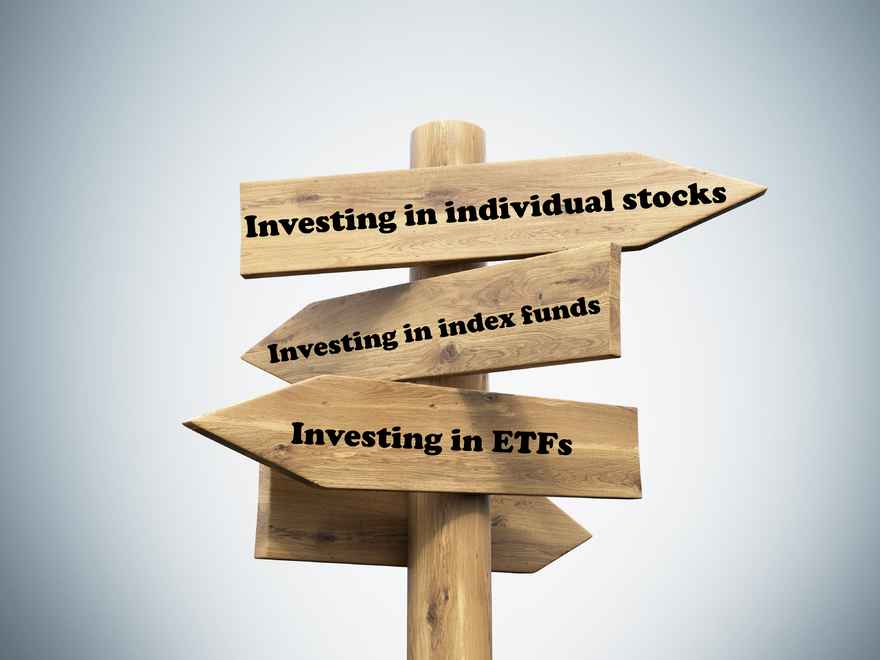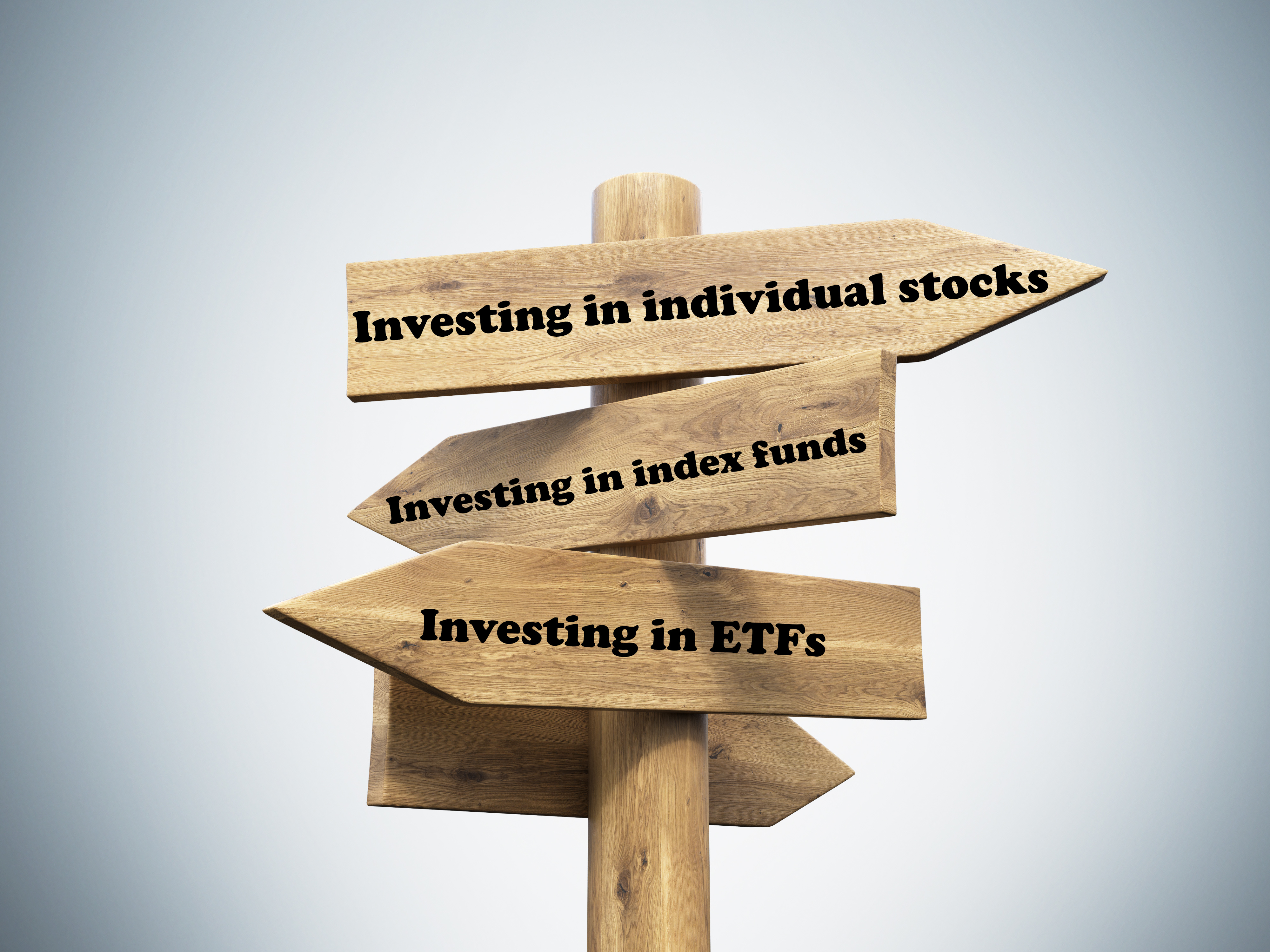Individual stock investing versus buying an ETF

 Do you own Index Funds or ETFs (Exchange Traded Funds)? Is it better to buy individual stocks or just own Index Funds? This month I answer these questions based on a reader's email I received recently...
Do you own Index Funds or ETFs (Exchange Traded Funds)? Is it better to buy individual stocks or just own Index Funds? This month I answer these questions based on a reader's email I received recently...
Reader's email
I recently received the following email:
"I discovered an ETF (index fund) that only buys the 30 stocks that make up the Dow Jones Industrial Index. I noticed those 30 stocks also appear in your Simply Investing Report. Instead of investing in individual stocks, shouldn't I just buy the Dow ETF?"
My 12 Rules of Simply Investing
Before I answer my reader's question, I'd like to list my 12 Rules of Simply Investing. I've designed my 12 Rules of Simply Investing to help you avoid mistakes, lower your risk, save you time, and help you to earn more by building for yourself a portfolio of safe stocks that will generate growing passive income for you each year. Do not invest in any stock, ETF, or Index Fund if it fails any of these 12 Rules:
- Do you understand the product or service offered by the company?
- Will people still be using this product or service in 20 years?
- Does the company have a low-cost durable (lasting) competitive advantage?
- Is the company recession proof?
- Has the company had consistent earnings growth? The EPS growth must be at least 8%
- Has the company had consistent dividend growth? The dividend growth must be at least 8%
- Does the company have a low payout ratio? Payout ratio must be 75% or less.
- Does the company have low debt? Debt must be 70% or less.
- Does the company have a good credit rating? Company must have a minimum S&P Credit Rating of “BBB+”.
- Does the company actively buy back its shares?
- Is the stock undervalued?
a. The P/E Ratio must be 25 or below.
b. Is the current dividend yield higher than the average dividend yield?
c. The P/B Ratio should be 3 or less. - Keep emotion out of investing.
A reminder to keep emotion out of the selection process. Discipline and patience are the keys to successful investing.
Answering my reader's question
I would not buy a Dow 30 ETF or Index Fund, here are my 5 reasons:
In this example I will use the following ETF:
ProShares Ultra Dow30 (https://www.proshares.com/funds/ddm.html)
1. This ETF contains non-quality stocks, for example Boeing and Disney have eliminated their dividend. Also some stocks in the ETF are not recession proof (Simply Investing Rule #4). Why would you buy stocks with a dividend yield of 0% when you could buy 3M (MMM) today and earn 3.7% in dividends?
2. With this ETF you are still paying fees, the fee (MER) is 0.95%, here are your fees if you invested $20,000:
- after 10 years you would have paid $2,752.45 in fees
- after 20 years you would have paid $8,694.77 in fees
- after 30 years you would have paid $21,523.81 in fees
After 30 years the amount you've paid in fees exceeds your initial investment of $20,000
If you were to buy all 30 stocks directly your total fee (trading commission) would be: $180
3. With this ETF you might be unintentionally buying overvalued stocks (Simply Investing Rule #11). Your gains are determined by the price you pay for your stocks, when you buy something that is overvalued (priced high) you reduce your future gains.
4. With this ETF the current yield is 0.97%, compare that to the dividend yield if you buy these Dow stocks individually:
MMM = 3.7%
MCD = 2.7%
HD = 2.4%
JNJ = 2.7%
PG = 2.7%
5. With individual stocks you have control. In the case of GE which used to be in the Dow, most people sold the stock after the 2nd dividend cut, but GE remained in the Dow for another 12-24 months, by the time GE was removed from the Dow the stock price had dropped considerably. With individual stocks you have control, you decide when to buy and when to sell. With this ETF you would have been stuck with GE for almost 2 years as its stock price continued to drop.
The amount of effort to place a stock order for 10 stocks is not that much from placing an order for an ETF (there are many Dow ETFs to choose from, you need to research one with the lowest MER). Most people think with an ETF I can buy it and then forget about it, you could do the same with buying the Dow companies individually if you choose to. With the ETF there is no fund manager, the ETF software only sells a stock when the company is removed from the Dow. But with individual stocks you decide when to buy and sell.
Index funds (ETFs) are best for...
Index funds and ETFs are best for people who:
- do not have the time or desire to select quality dividend-paying stocks when they are undervalued (even though the SI Report makes this very easy and quick to do)
- do not have the knowledge to select individual stocks (the SI Course makes this easy to do)
- do not have the patience or confidence to invest on their own (I'm here to help you gain confidence)
If you do decide to buy Index Funds or ETFs, remember that the fees will add up over time and you returns will suffer when you unintentionally buy stocks that fail the 12 Rules of Simply Investing.
I'm here to help
I can help you to start investing today, why re-invent the wheel when you can learn from my 20-years of being in the stock market. I've witnessed first hand the ups and downs of the market, and I know what it's like to start investing your hard earned money. I created the 12 Rules of Simply Investing to help you get started right away, so you don't have to wait on the sidelines any longer. The sooner you start investing the sooner you will be on your path to financial freedom.
Did you enjoy reading this article? If so, I encourage you to sign up for my newsletter and have these articles delivered via email once a month … for free!

1 comment
Thanks, it is all clear ... ETFs are out for me.
Leave a comment